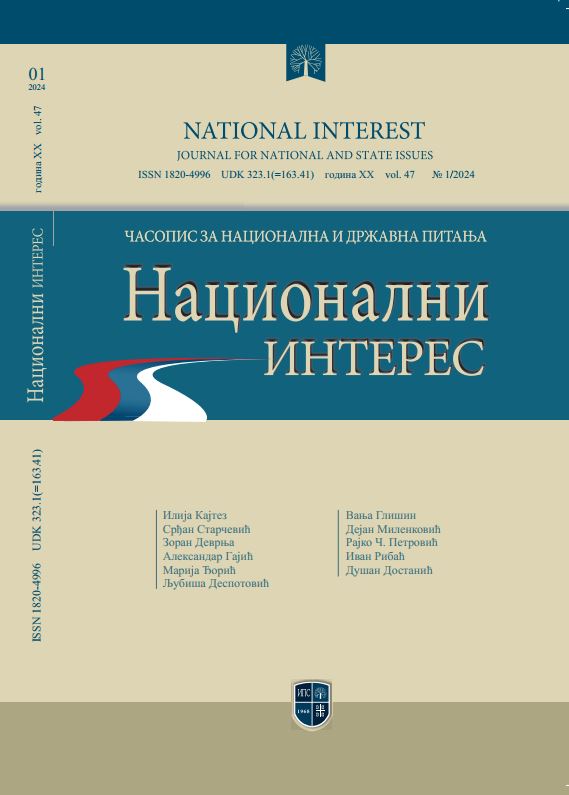THE NEED FOR PHILOSOPHY IN THE (POST)MODERN WORLD
Abstract
To think about essential questions, the meaning of human existence, social-historical and ontological riddles of the World, necessarily means being in the chambers of philosophy. Unfortunately, our (post)modern, globalized and busy world is turning its back on the wisdom of all ages. In this paper, the authors point to the rejection of philosophy in the modern consumer society and search for answers to questions about the need to study philosophy today, about its importance for man, people and humanity. The work consists of three parts, in which a contribution is made to the understanding of the importance of philosophy for man, society and humanity, the reasons for the rejection of philosophy in the modern age are explored, and the relationship between philosophy and science is examined.
Philosophy is needed by modern man/society/humanity for the same reasons it was needed in the past, but the need for it is hidden in modern consumer society.
Philosophy is eternal and everlasting. If the root of philosophy is about 27 centuries deep and has survived all radical changes in the world and all (r)evolutions, rulers and dynasties, political and social movements, all wars and destructions, all geographical discoveries and the exploring of the Cosmos, is it wise to voluntarily deny such a deep source of wisdom?
In contrast to today's consumer who is lost in his own life, philosophy gives us an insight that can be healing and beneficial. But we should have a fruitful conversation with philosophy, and not just have a historical retrospective, because we who are still alive need philosophers and their wisdom of the ages. A philosopher looks for the essential and the necessary in everything, and this separates him from those people who deal with unimportant things, phenomena, processes. Of course, a philosophically minded person never underestimates the knowledge and meaning of exact sciences and techniques and technical progress. Communicating with the wisdom of the ages is both healing and valuable and benefits both the individual and the community to which he or she belongs.
References
Аристотел. 1958. Никомахова етика. Београд: Култура.
Аристотел. 1971. Метафизика. Београд: Култура.
Диоген Леартије. 1979. Животи и мишљења истакнутих филозофа. Београд: БИГЗ.
Дулић, Драгана. 1995. Увод у филозофију. Београд: Завод за уџбенике и наставна средства.
Кајтез, Илија. 2012. Мудрост и мач. Београд: МЦ Одбрана.
Кајтез, Илија. 2021. „Реч-две о српској историји.” Печат, бр. 649.
Колаковски, Лешек. 1987. „Модерно на бесконачној проби”. У О кризи, ур. Кшиштоф Михалски, 66–78. Нови Сад: Књижевна заједница Новог Сада.
Коларић, Иван. 1998. Филозофија. Ужице: Учитељски факултет Ужице.
Кораћ, Вељко и Бранко Павловић. 1992. Историја филозофије. Београд: Завод за уџбенике и наставна средства.
Печујлић, Мирослав. 1982. Методологија друштвених наука. Београд: Савремена администрација.
Рајнберг, Самуил А. 1949. Методика и техника научног рада, Београд: Медицинска књига.
Расел, Бертранд. 1998. Историја западне филозофије. Београд: Народна књига.
Сакан, Момчило. 2023. Парадигме војних наука. Нови Сад: Тампограф.
Bense, Max. 1978. Čemu još filozofija. Zagreb: Zbornik CKD SSO Zagreb.
Bernstein, Richard Ј. 1985. Habermas and Modernity. Cambridge: MIT Press.
Blekburn, Sajmon. 1999. Oksfordski filozofski rečnik. Novi Sad: Svetovi.
Browning, Oscar. 1908. An Introduction to the History of Educational Theories. London: Kegan Paul, Trench L&Co Ltd.
Čupić, Čedomir. 2019. Politika i intelektualci. Beograd: Čigoja štampa.
Descartes, Rene. 1897–1913. Principia philosophiae. IX, 2. Paris: Adam et Tannery.
Filipović, Vladimir. 1984. Filozofijski riječnik. Zagreb: Nakladni zavod Matice hrvatske.
Fink, Eugen. 1984. Osnovni fenomeni ljudskog postojanja. Beograd: Nolit.
Freud, Sigmund. 1979. Autobiografija, Nova predavanja za uvodjenje i psihoanalizu. Novi Sad: Matica srpska.
Gaggi, Silvio. 1989. Modern/Posmodern. Philadelphia: University of Pennsylvania Press.
Gidens, Entoni. 2006. Sociologija, Beograd: Ekonomski fakultet Beоgrad.
Hegel, Georg W. F. 1964. Istorija filozofijе, I-III. Beоgrad: Kultura.
Hegel, Georg W. F. 1965. Enciklopedija filozofskih znanosti. Sarajevo: Veselin Masleša.
Hegel, Georg W. F. 1983. Јенски списи. Сарајево: Логос, Веселин Маслеша.
Heidegger, Martin. 1990. Pevanje i mišljenje. Beograd: Moderna.
Kant, Imanuel. 1970. Kritika čistog uma. Beоgrad: Kultura.
Lyotard, Jean Francois. 1995. Šta je posmoderna. Beograd: KIZ Art press.
Peri, Marvin. 2000. Intelektualna istorija Evrope. Beograd: Clio.
Ricer, Džordž. 2012. Savremena sociološka teorija i njeni klasični koreni. Beograd: Službeni glasnik.
Ručnov, Drago. 2007. Od sablje do melema. Beograd: Čugura print.
Stojiljković, Zoran. 2013. Држава и корупција. Beograd: Čigoja štampa.
Šušnjić, Đuro. 1999. Orvelijana. Beograd: Čigoja štampa.
Šušnjić, Đuro. 2004. Drama razumevanja. Beograd: Čigoja štampa.
Šušnjić, Đuro. 2015. Teorije kulture. Beograd: Zavod za udžbenike.
Uzelac, Milan. 2004. Istorija filozofije. Novi Sad: Stylos.
Vajld, Oskar. 2006. De Profundus. Beograd: NNK Intencional.

